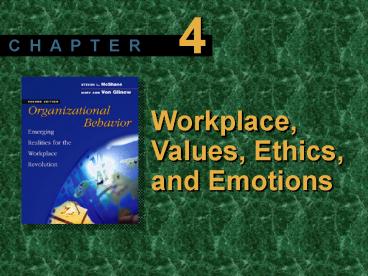Workplace, Values, Ethics, and Emotions - PowerPoint PPT Presentation
1 / 21
Title:
Workplace, Values, Ethics, and Emotions
Description:
Values: stable, long-lasting beliefs about what is important; define right or ... assertiveness, competitiveness, & materialism (achievement) versus relationships ... – PowerPoint PPT presentation
Number of Views:93
Avg rating:3.0/5.0
Title: Workplace, Values, Ethics, and Emotions
1
4
C H A P T E R
Workplace, Values, Ethics, and Emotions
2
Values at Work
- Values stable, long-lasting beliefs about what
is important define right or wrong, good or bad - Espoused
- What we want others to believe we hold
- Enacted
- Values in use, what we actually practice
3
Importance of Values at Work
- Globalization
- Increasing awareness of sensitivity to
different values - Replacing Direct Supervision
- Potentially aligns employees decisions actions
with corporate goals - Demand for Ethical Practices
- Increasing pressure to engage in ethical practices
4
Cultural Differences in Values
- 5 Cross-Cultural Values
- Individualism vs. Collectivism
- Power Distance
- Uncertainty Avoidance
- Achievement vs. Nurturing Orientation
- Long vs. Short-Term Orientation
5
Individualism- Collectivism
Individualism
UnitedStates
Germany
- Degree to which people value individualism vs.
group goals
Japan
China
Collectivism
6
Power Distance
High Power Distance
Malaysia
- Extent to which people accept unequal
distribution of power in society
France
Japan
United States
Germany
Low Power Distance
7
Uncertainty Avoidance
High Uncertainty Avoidance
Japan
- Degree that people tolerate ambiguity (low
uncertainty avoidance) or feel threatened by
ambiguity uncertainty (high uncertainty
avoidance)
Germany
United States
Singapore
Low Uncertainty Avoidance
8
Achievement-Nurturing
Achievement
Japan
- Degree that people value assertiveness,
competitiveness, materialism (achievement)
versus relationships well-being of others
(nurturing)
United States
South Korea
Sweden
Nurturing
9
Long/Short-Term Orientation
Long-Term Orientation
China
- Degree people value thrift, savings,
persistence (long-term) versus past present
issues (short-term)
Japan
Netherlands
United States
Russia
Short-Term Orientation
10
3 Ethical Principles
- Utilitarianism
- Greatest good for greatest number
- Individual Rights
- Fundamental entitlements in society
- Distributive Justice
- Inequality must have equal access
- Inequality must benefit the least well off
11
Influences on Ethical Conduct
- Moral Intensity
- Degree issue demands ethical principles
- Ethical Sensitivity
- Ability to recognize the presence determine the
relative importance of an ethical issue - Situational Influences
- Competitive pressures other conditions affect
ethical behavior
12
Emotions, Attitudes, Behavior
Feelings
Attitude
13
Managing Emotions
- Emotional Labor effort, planning control
needed to express organizationally desired
emotions during interpersonal transactions
14
Managing Emotions
- Display Rules display certain emotions withhold
others display norms vary across cultures - Emotional Dissonance conflict between required
true emotions causes stress job burnout
15
Emotional Intelligence
- Emotional Intelligence (EQ) ability to monitor
ones own others feelings emotions, to
discriminate among them, use this info to guide
ones thinking actions - Physicians have above average IQ (120), but
below average EQ (90)
16
Emotional Intelligence Dimensions
Self- Awareness
Emotional Intelligence
Self- Regulation
Social Skill
Self- Motivation
Empathy
17
Job Satisfaction
- Research Results
- Decreases voluntary turnover absenteeism
- Decreases employee theft violence
- Increases customer satisfaction
- Increases profitability
- Weak link to task performance
18
Job Satisfaction
- How satisfied are you
- with your job?
- 41 completely satisfied
- 44 somewhat satisfied
- Americans have 4th highest satisfaction rating in
survey of 39 countries
19
Job Satisfaction
Org. Practices
20
Organizational Commitment
- Affective Commitment
- Loyalty to the organization, co-workers,..
- Continuance Commitment
- Staying with the organization serves your
personal needs too costly to quit
21
Building Organizational Commitment
- Maintain fairness satisfaction
- Provide some job security
- Support organizational comprehension
- Involve employees in decisions
- Build trust































